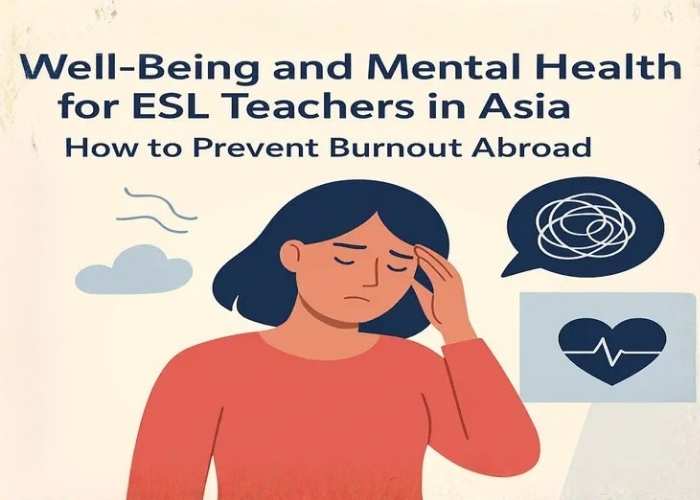Many people in the US, UK, Europe, Korea, and China want to teach English in other countries. Because of its rich culture, nice students, intriguing food, and high demand for English study, Asia has become one of the most popular places for ESL teachers to work. Japan, South Korea, Vietnam, Thailand, and China are just a few of the countries that hire thousands of teachers every year. Teachers from all over the world want to take advantage of these chances to travel, learn new things, and live in a new place.
But many ESL teachers experience problems that they didn’t see coming behind the adventure. Foreign instructors can feel homesick, worried, overwhelmed, or alone, especially in their first year. Living in another country may be both exciting and stressful. If you don’t have the correct plans, these stresses can make you burn out.
This blog will help you learn what burnout is, why it happens, and how to keep your mental health in good shape while teaching English in Asia. These ideas can help you stay balanced, focused, and happy whether you are already working overseas or getting ready to start your journey.
How to Recognize Burnout as an ESL Teacher
Burnout is more than just being stressed. It is a long-term physical, emotional, and mental fatigue that accumulates over time. When teaching English as a second language (ESL) abroad, teachers often have to deal with problems that are different from those they experience at home. These include language obstacles, cultural differences, visa pressure, severe workloads, and a lack of support systems. If you don’t pay attention to these little pressures, they might build up and hurt your health.
Signs that you are burned out
• Being fatigued even after sleeping
• Not wanting to teach anymore
• Getting angry or annoyed in class
• Feeling like you don’t fit in with your coworkers or pupils
• Headaches or trouble concentrating
• Staying away from social events
• Changes in mood
• Feeling stuck or not wanting to do anything
If you know these indicators early on, you can do something about them before they get worse.

Why ESL Teachers in Asia Get Burned Out
Every teacher’s experience is unique, yet many of them confront the same problems when they work abroad. These are the most typical reasons why foreign English teachers in Asia get burned out.
1. Stress from adjusting to a new culture
It’s wonderful to move to a new nation, but culture shock is real. At first, shopping, banking, and taking public transportation can be stressful. In places like Japan or China, you might not be used to the language or the way people act.
2. Preparing Lessons and Workload
Some schools want instructors to plan a lot of lessons each week, handle big classes, and be involved in school events. This amount of work can be hard to handle, especially in private schools or cram schools.
3. Being alone and missing home
Teachers from the US, UK, Europe, Korea, or China may feel lonely because they are far away from their family and friends. The time zone differences also make it harder to keep in touch.
4. The need to do well
Parents and students in Asia often have high expectations of each other. Teachers think they need to act like experts, offer great classes, and help their students achieve well.
5. Not being clear with your boss
It could be challenging to understand supervisors or coworkers because of language or cultural differences. This makes work life more stressful than it has to be.
6. Not Feeling Prepared
New teachers could be scared or unsure about how to deal with a lot of pupils, new approaches of teaching, or running a classroom.
Why Mental health for ESL Teachers in Asia in Important
Teachers may be creative, patient, and productive when their mental health is good. When you look after your health:
• You teach better
• Students are more likely to respond positively
• You have a good time while you’re away
• You stay on the work longer and don’t get burned out early.
• You become more confident and emotionally strong.
Living in another country is a unique chance. Taking care of your mental health makes sure you enjoy it to the fullest.

How to Avoid Getting Burned Out as an ESL Teacher in Asia
Here are some useful tips for teachers living abroad to keep their mental health in check and stay balanced.
1. Make a routine that helps you stay healthy.
A stable schedule might help your body and mind get used to a new place. Try to add:
• A regular sleep pattern
• Meals that are good for you
• Time for fun things
• Get some exercise
• Things to do with other people
• Times to relax every day
A schedule helps you stay organized and lowers your stress.
2. Make sure your work and personal life are in balance.
You can feel like you have to work extra hours, organize lessons every night, or participate every school activity. But it’s necessary to set limits.
Here are some ways to secure your free time:
• Decide how long you want to plan lessons for
• Don’t check work mails after hours.
• Spend your weekends resting, doing things, and discovering new things.
• Don’t be afraid to say no
A balanced existence keeps your vitality up.
3. Create a Support Network Abroad
One of the hardest things for foreign teachers is feeling alone. Try to find people who can relate to what you’re going through.
You are able to:
• Become a member of a group for expats or teachers
• Go to language exchange meetings
• Get in touch with coworkers
• Become a member of Facebook communities for ESL teachers in Asia
• Get to know people in your area at community activities
Having good friends makes living abroad a lot more fun and enjoyable.
4. Learn the Basics of the Local Language
Learning a few easy phrases in Korean, Japanese, Thai, or Chinese will help you relax. It makes it easier to talk to people and feel like you’re a part of the community.
You can take basic lessons or use applications like Duolingo. People in the area appreciate even tiny efforts.
5. Take care of yourself every day
Taking care of yourself isn’t only about relaxing. It’s about making sure you do things every day to protect your mental and physical wellness.
Here are some ideas for taking care of yourself:
• Mindfulness or meditation
• Walking or doing light exercise
• Writing in a journal or reading
• Playing music
• Going to parks or ecological areas
• Doing things you enjoy, like cooking or making art
Ten minutes a day can make a tremendous difference.
6. Explore Asia and enjoy your surroundings.
Going to different towns, temples, mountains, and beaches might help you relax and clear your thoughts. There are so many great sites in Asia, and exploring them will remind you why you came in the first place.
Plan trips for the weekend and find out:
• Markets for street food
• Festivals of culture
• Shores
• Peaks
• Places of historical interest
• Cafés in the area
Adventure is a part of the experience.
7. Be sure on how to run your classroom
One of the main reasons people become burned out is stress in the classroom. To lessen this stress:
• Make lessons that are easy to understand and work
· Follow the rules of the classroom
• Keep pupils interested with ESL games
• Make the rules for behavior explicit
• Get guidance from coworkers
• Find out about the culture and needs of your students.
Teaching is considerably easier and more fun when the class is well-managed.
8. Know Your Rights as a Teacher
Knowing what your job contract says can help you relax. Know what your rights are about:
• Hours of work
• Pay
• Places to live
• Days off for vacation
• Time off for illness
• What you need to get a visa
Ask questions if anything doesn’t make sense. A lot of teachers are stressed out because they don’t know the rules in their area.
9. Get Some Rest When You Need It
Your mental wellness is more essential than always being productive. If you feel like you can’t handle it:
• Take a little break
• Take a day off for yourself
• Cut back on your work for a while
· Talk to your boss or HR
Taking breaks keeps you from being burned out and helps you come back stronger.
10. Get professional help when you need it.
If you have long-term stress, depression, or anxiety, talking to a mental health professional can help. There are now English-speaking therapists available in person and online in several Asian nations.
Useful platforms:
• BetterHelp
• Talkspace
• Counseling services for expats in the area
It’s okay to ask for help when you need it.
Healthy Habits That Matter a Lot
Here are some tiny things you can do every day that will make a great difference in how you feel mentally:
• Get enough water
• Have meals that are balanced
• Cut back on sweets and caffeine
• Get 7 to 8 hours of sleep
• Work out three to four times a week
• Get some fresh air
• Don’t use your phone or social media too much
• Be thankful
You feel more energetic, focused, and emotionally secure when you have healthy habits.
Finding Joy in the ESL Journey
If you want to grow as a person, enhance your teaching skills, and see a beautiful area of the world, teaching English in Asia is a great way to do all of those things. You may have a good time without feeling overwhelmed if you have the correct attitude and support.
Don’t forget that you’re not alone. A lot of teachers feel the same way. Mental health for ESL teachers in Asia is important, and taking care of yourself will help you teach better. You can always get aid if you need it. There is so much to see and do in Asia. Take care of your mental health, and you’ll enjoy every bit of this wonderful trip.


